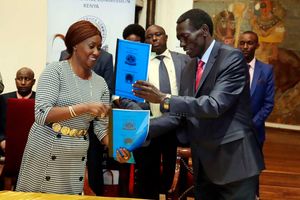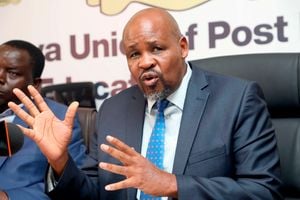
Knut officials address journalists at the Union’s headquarters in Nairobi on August 25, 2024 .
The Kenya National Union of Teachers (Knut) is pushing for a 60 percent basic salary increment and better allowances for its members in a proposed agreement presented to the teachers' employer.
The draft proposal was developed after more than one year of consultations and seeks to compensate teachers for what the union terms as ineffective previous Collective Bargaining Agreements (CBAs).
The current CBA, which is non-monetary, will expire on June 30, 2025, and negotiations with the Teachers’ Service Commission (TSC) for the 2025 – 2029 agreement are now at an advanced stage.
“We have presented our demands to TSC on the new CBA with a 60 percent salary increment and several other components of allowances and other non-monetary benefits,” said Collins Oyuu, the secretary-general of Knut.
He said the union was actively engaging the employer, in line with legal provisions outlined in Kenya's labour laws.
“We are at the tail end of negotiations and look forward to signing this vital document by July 2025,” he added.

The Secretary General Kenya National Union of Teachers Collins Oyuu speaks to delegates during an annual conference in Mombasa on December 10, 2024.
Knut and the Kenya Union of Post Primary Education Teachers (Kuppet) previously faced criticism from members for signing the 2021 – 2025 CBA which did not incorporate a monetary component. However, the unions defended their decision, arguing that rejecting the deal could have triggered a legal crisis due to looming deadlines.
The last teachers’ strike was in August 2024 with demands centred on promotions, implementation of the existing CBA and delayed release of funds for the teachers’ medical insurance cover.
Historically, teachers' unions have had longstanding disputes with TSC over delayed or unfulfilled salary increments, often resorting to industrial action.
“The government is always quick to sign CBAs but slow to implement them. We shouldn’t have had to issue a strike notice for TSC to implement a Presidential directive on salary increments,” said Knut first national vice chair Malel Langat.
Although the current CBA did not include financial benefits, teachers received a 10 percent pay rise in the 2024 – 2025 budget cycle following President William Ruto’s intervention. Prior to that, the only other benefits were the extension of maternity leave from 90 to 120 days and paternity leave from 14 to 21 days.
Knut is also pushing for several reforms in the handling of teacher welfare and employment conditions. For instance, the union wants disciplinary cases concluded within a month and appeals against dismissal resolved within three months to avoid unnecessary delays.
Unlike university lecturers, teachers in primary and secondary schools, as well as colleges, are not eligible for sabbatical leave. Knut is advocating for the introduction of such leave to allow teachers to pursue academic advancement or conduct research.
“Teachers should enjoy sabbatical leave whenever they are pursuing higher education or conducting research for books related to their profession,” said Mr Langat.
Holiday compensation
The union is further proposing that teachers who work during public holidays be compensated either through a fixed monetary allowance or overtime payments.
In the new CBA, Knut also demands that TSC pay three incremental credits to teachers working in arid and semi-arid lands (Asal) and other hard-to-staff areas. It wants acting allowances for teachers holding positions such as deputy head teachers, deputy principals, and heads of departments but have not been confirmed.
Risk allowances for all public school teachers, particularly those working in volatile or high-risk areas, are also part of Knut’s proposal. Additionally, the union is lobbying for teachers to be allowed to contest elective political positions during general elections or by-elections. Those who lose should be permitted to resume their duties without victimisation.

Teachers Service Commission Chief Executive Officer Nancy Macharia before the National Assembly Education Committee at Bunge Tower Nairobi on Wednesday, October 23, 2024.
“Employers should allow teachers to vie for elective positions. If they lose, they should return to their posts,” reads the Knut document submitted to TSC.
On leave allowances Knut proposes that teachers receive the equivalent of one month’s basic salary. According to the union, this would help prevent burnout and boost productivity.
The union is also seeking the introduction of an extraneous allowance, arguing that teachers continue to work beyond official hours, often preparing lessons or marking assignments late into the night.
The signing of the new CBA is expected to coincide with the exit of TSC CEO Nancy Macharia, whose 10-year tenure ends in June 2025.
Kuppet demand
Meanwhile, the Kenya Union of Post Primary Education Teachers (Kuppet) has made a demand for an increase of between 50 and 100 percent in their members’ basic pay as well as improved allowances.
The acting Secretary-General Moses Nthurima said that the 100 percent proposal is for the lowest and highest-earning teachers to receive a 50 percent pay raise.
He said that the intention is to close the gap between the highest-earning teachers who happen to be classroom teachers and their bosses. The union has also called for harmonization of house allowances for teachers working in other parts of the country with those working in Nairobi.

Kenya Union of Post Primary Education Teachers (Kuppet) Deputy Secretary-General Moses Nthurima on February 6, 2025 in Nairobi.
“All teachers deserve decent housing,” Mr Nthurima said.
He confirmed that Kuppet has been invited by the TSC for a job evaluation exercise for teachers that will then be followed by the formal negotiations on the terms and conditions of the agreement. He revealed that the union has also met with TSC, the Salaries and Remuneration Commission and Education Committee of the National Assembly to chart the way for the new CBA. The negotiations are expected to commence in May 2025.
“Kuppet has demanded that the capitation for medical insurance be doubled so that teachers can access the best hospitals. We also need risk allowance for science teachers,” Mr Nthurima said.
The union will also push for a review of the career progression guidelines to create two pathways for career progression; one for administrators and one for classroom teachers who do not wish to go into administration.
“We also want harmonization of teachers’ salaries with the staff at the secretariat. TSC pays those at the headquarters 50 to 60 percent more than classroom teachers. This at times is discrimination within the same job group,” he said.












